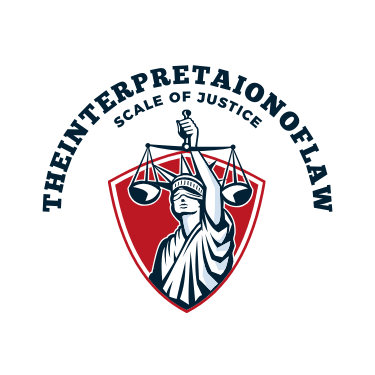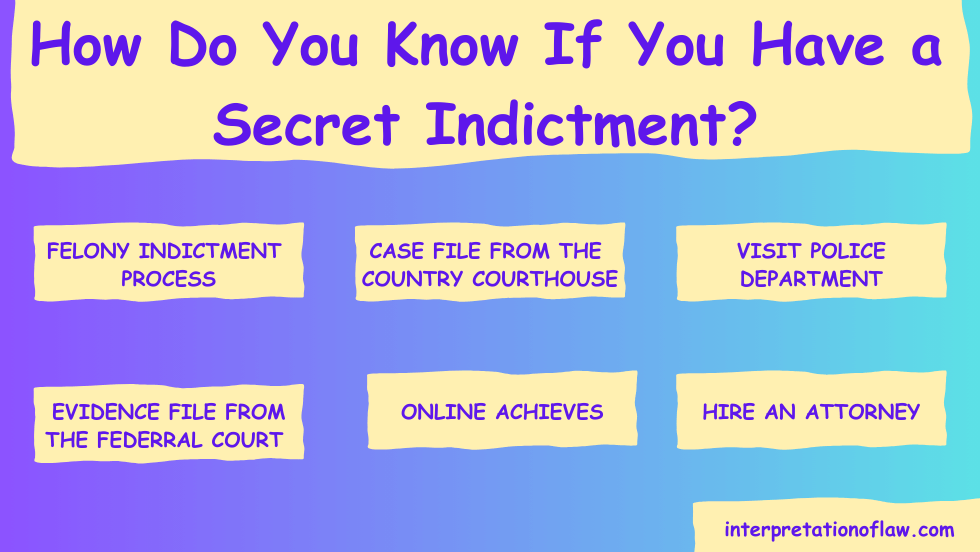In the complex world of legal proceedings, understanding if you have a secret indictment against you can seem daunting. However, gaining clarity on this matter is not only possible, but it’s also absolutely crucial.
How to check if you have an indictment? This guide simplifies the process for you, providing clear, concise, and easily digestible information to help you navigate these tough times. We’re here to demystify the legal jargon and offer guidance, ensuring you’re not left in the dark. Let’s dive into the process step by step.
What Is a Secret Indictment?
A secret indictment, also known as a sealed indictment, is a type of charge that is kept non-public by the courts for some time. This usually happens when an individual is under investigation but has yet to be arrested.
Making an indictment ‘secret’ or ‘sealed’ prevents the suspect from evading the legal process, tampering with evidence, or fleeing before they can be apprehended. It’s important to note that while the indictment’s existence is kept secret, the accused will be informed about it once it’s unsealed and they are officially charged.
In certain instances, it is deemed necessary to maintain confidentiality regarding an indictment. This is also referred to as a sealed indictment or silent indictment. In such cases, the documentation about the indictment is kept under seal, and any involved parties are prohibited from discussing the indictment beyond the grand jury hearings. After the conclusion of the hearings, no further discussion of the indictment is permitted. Once the seal is lifted, the contents of the indictment can be made publicly available.
What does it mean to have been indicted?
Being indicted means that a grand jury of citizens has determined there is sufficient evidence to prosecute you for a crime. This is a significant step in the legal process and can have serious consequences. It means that formal charges have been brought against you by the government.
An indictment can also be referred to as being “charged” or “accused.” It signifies that the prosecuting attorney believes they have enough evidence to convict you of a crime and intends to bring your case to trial. This is why it’s essential to know if there is a secret indictment against you, as it can significantly impact your life.
Learn more :Can an indictment be dismissed?
How do you know if you have a secret indictment?
An indictment is a formal accusation made by a grand jury, charging a person with a criminal offense, usually a felony. It means the prosecution believes there is enough evidence to bring the case to trial. An indictment is different from other legal documents, such as arrest warrants and information, which are charges filed by prosecutors without the involvement of a grand jury.
Checking if you have an outstanding indictment is crucial as it allows you to be prepared and take appropriate legal action before being surprised. Here are the steps to check whether you have an outstanding indictment:
1. Learn the Felony Indictment Process
Understanding the indictment process can be vital for you or someone you know who has been accused or may be indicted. The prosecution isn’t required to inform a defendant that a judge is considering indicting them until it has been officially handed down. Stay informed and consult with an attorney familiar with the process.
2. Visit Local Police Departments
Contact the local police department in your area for information on your criminal background and any possible indictments. Remember that you can access only your criminal history, not someone else’s.
Each state may have different rules and procedures for requesting this information. Check with local police and judiciary departments in places where you have ties, such as previous residences or business locations.
3. Access Case Files from the County Courthouse
Indictments are usually accessible at county courts and are filed within a few months of the alleged crime. They contain the defendant’s information, the alleged offense(s), and a statement from the prosecutor’s office.
Consider having your attorney examine these court records for you. Confidentiality laws bind attorneys and are not required to disclose your whereabouts to the court.
4. Review Local & State Court Records
A search of both local and federal court documents may yield duplicated data relating to certain police files that have already been reviewed. However, this data can still provide valuable insights if the identities of the individuals involved are known. When requesting such records, it is necessary to contact the local judicial process in the same manner as the police.
5. Evidence Files from the Federal Courts
If it becomes necessary to verify the spelling of an individual’s identity, it is possible to request a copy of the indictment from the court located at any federal courthouse. The magistrate has the authority to order the accusation to remain confidential until the subject is apprehended or has been served with a citation. Any charges related to this matter will be classified and unavailable to your attorney. However, your legal counsel should be able to provide you with insights regarding the possibility of a sealed indictment.
6. Check Online Resources
An experienced criminal defense attorney can help you check the relevant court records and guide you through the process. Legal representation can also help you understand how any indictment impacts your case and the best possible course of action.
7. Obtain Legal Assistance
An experienced criminal defense attorney can help you check the relevant court records and guide you through the process. Legal representation can also help you better understand how any indictment impacts your case and the best possible course of action.
What happens after an indictment?
After an indictment is issued, the accused will be officially charged and arraigned in court. During this process, the defendant will enter a guilty or not guilty plea. If the defendant pleads guilty, a conviction can be entered without trial. However, if the defendant pleads not guilty, a trial will occur.
During the trial, the prosecution and defense will present their evidence and arguments, and a jury or judge will determine the defendant’s guilt. The defendant may face imprisonment, fines, probation, or community service if found guilty.
If acquitted of all charges, the defendant will be released from custody. However, if convicted, an appeal can be made to try and overturn the conviction. It is essential to remember that an indictment does not automatically mean a conviction, and the accused has the right to defend themselves in court.
What is the 45 day indictment rule?
The 45-day indictment rule, also known as the Speedy Trial Act, is a federal law requiring an indicted defendant to be brought to trial within 45 days of arraignment. This means that the prosecution must be ready for trial within this timeframe and cannot delay or postpone the trial without valid reasons.
If the defendant is not brought to trial within 45 days, they can file a motion to dismiss the indictment based on violating their right to a speedy trial.
This rule is in place to prevent defendants from being held in custody for extended periods without a trial. However, there are exceptions to this rule, such as delays caused by the defendant or their legal counsel.
FAQs:
What is the difference between a charge and an indictment?
A charge is a formal accusation by law enforcement against an individual for committing a specific crime. It can be filed at any stage of the criminal justice process, from the initial arrest to after a grand jury has indicted an individual.
On the other hand, an indictment is a formal written accusation issued by a grand jury that declares there is enough evidence to hold a trial. It is a step in the legal process that leads to a trial and possible conviction.
Does indicted mean guilty?
No, being indicted does not automatically mean an individual is guilty of the alleged crime. An indictment merely states that there is enough evidence for a trial. The defendant still has the opportunity to defend themselves in court and prove their innocence.
How long does a secret indictment take?
The time it takes for a secret indictment to be issued varies and can depend on the case’s complexity, the availability of witnesses, and other factors. Sometimes, a secret indictment may not be issued until months or even years after an alleged crime. It is best to consult with legal counsel for more specific information on your case.
Summary
This document discusses the importance of reviewing court records and obtaining legal assistance when facing an indictment. It also mentions how a defendant may enter a plea, what happens during a trial, and the possible penalties for conviction or acquittal. Additionally, it covers the 45-day indictment rule and answers frequently asked questions about indictments. This information can help individuals better understand the legal process and their rights when facing a charge.
Warnings and Disclaimers
In conclusion, if you suspect an indictment might have been filed against you, be proactive in seeking information by contacting local law enforcement agencies, accessing available online resources, and consulting an attorney to ensure you’re well-prepared to address any potential legal challenges.
References:
https://www.law.cornell.edu/wex/indictment
https://www.nolo.com/legal-encyclopedia/difference-between-an-indictment-a.html
https://www.justice.gov/usam/criminal-resource-manual-604-speedy-trial-time-limits
https://criminal.findlaw.com/criminal-procedure/the-speedy-trial-rule.html
https://www.justice.gov/usam/criminal-resource-manual-701-procedures-grand-jury-selection-investigative-grand-jury
https://www.law.cornell.edu/wex/grand_jury.

Carter Wilson is a licensed lawyer with over 10 years of experience in various legal fields. He is passionate about making law accessible to the general public and helping individuals navigate through complex legal matters.

